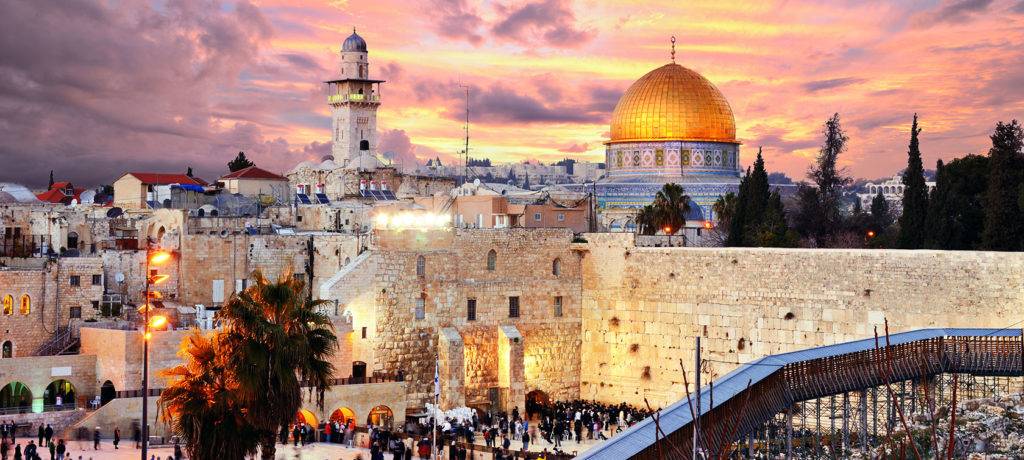Tips to travel to Israel

You may have a few questions before planning a trip to the Holy Land; like… is Israel safe to travel? What should you wear?
Here are some things you should know before your trip
Pack appropriate clothing & be mindful what you wear
One of the most important tips for travel to Israel is to be mindful of what to wear. Whilst Israel is a mostly liberal country, there are varying dress codes and requirements throughout the different cities and regions. In Tel Aviv you can literally wear what you want; in Jerusalem holy city/mount of olives/markets etc – modesty is expected; and Nazareth, as an Arab city, appreciates shoulder to knee coverage. (Tip: always have a scarf/shawl handy for emergency coverage)
Keep safety in mind
Life on the ground in Israel is on the whole safe and peaceful. All Israeli citizens are subject to conscription and national service meaning that is is normal to see members of the armed forces as young as 18 patrolling the streets with machine guns, but this is comforting rather than confronting. As with any destination in the world, visitors should excise natural and normal levels of caution and awareness.
Don’t worry about the passport stamp
Tourist visitors to the country no longer have to be concerned with receiving the troublesome Israeli passport stamp. (FYI – Due to tensions in the region, there are several Arab nations who do not allow visitors into their country if they have previously visited Israel). Instead, on arrival you will have your photograph taken and a barcode issued which is given to you, along with your personal information, on a small blue identity card. This tourist card is to be presented to all hotels or car rental agencies to prove you are on a tourist visa and is important for business to record for tax purposes (as tourists are exempt). It is important not to loose this card (which is just smaller than the size of a credit card) but it is not the end of the world if you do – you’ll just have pay tax. On your departure from the country you’ll be provided with another version of the card, except this one will be pink. You can keep them both as souvenirs, but I would recommend not carrying them inside your passport in case you inadvertently hand them over at a subsequent border crossing.
Can you drink tap water?
Whilst tap water is safe and drinkable in Israel (except at the Dead Sea), it’s mineral composition is likely different to what you are used to and may make you feel queasy. As an alternative, bottled water is readily available, and the majority of hotels and hostels have a drinking fountain that you can refill your own.
The Dead Sea – The lowest point on Earth
You can’t visit Israel and not take a dip in the Dead Sea. Known throughout the world because of it’s high salt content which allows visitors to float effortlessly, and for the therapeutic mud which forms at the edges of the water. However – DO NOT SHAVE for a few days before visiting – open pores (or any broken skin) don’t half sting when submerged in salty water.
Is tipping part of the culture of Israel?
Tipping in Israel is discretionary but expected, similar to most of the Western world. The Going rate is between 10-15% with 10% being the lowest, 12% average and 15% for great service.Waiters and bartenders are generally paid a low salary with the majority of their earnings coming from tips. However, tipping taxi drivers, on the other hand, is not usually expected.
LEARN SOME USEFUL WORDS BEFORE YOU GO
When in Israel you’ll see and hear English, Hebrew and Arabic, but learning a few words of Hebrew will certainly put you in good stead with the Jewish locals.
- Shalom – Universal for hello, goodbye and a few things in between. It’s direct translation is “peace”
- Bevakasha – Please
- Toda/Toda Raba – Thank you/Thank you very much
- Chen/Ken & Lo – Yes & no.
- Sababa – Cool / Great / Alright / Sure
- Beseder – a simple OK (but one that isn’t too over enthusiastic!)
- L’chaim – is what you say for ‘Cheers’ & the literal translation is “to life”
- Slicha – Excuse Me / Pardon me / Sorry
- Tov is Hebrew for “good”: ie. Mazel Tov (Good Fortune) or Boker Tov (Good Morning)
- Lehitra’ot – See You Later
Extract from maketimetoseetheworld.com by Vicki Garside https://maketimetoseetheworld.com/israel-travel-tips/